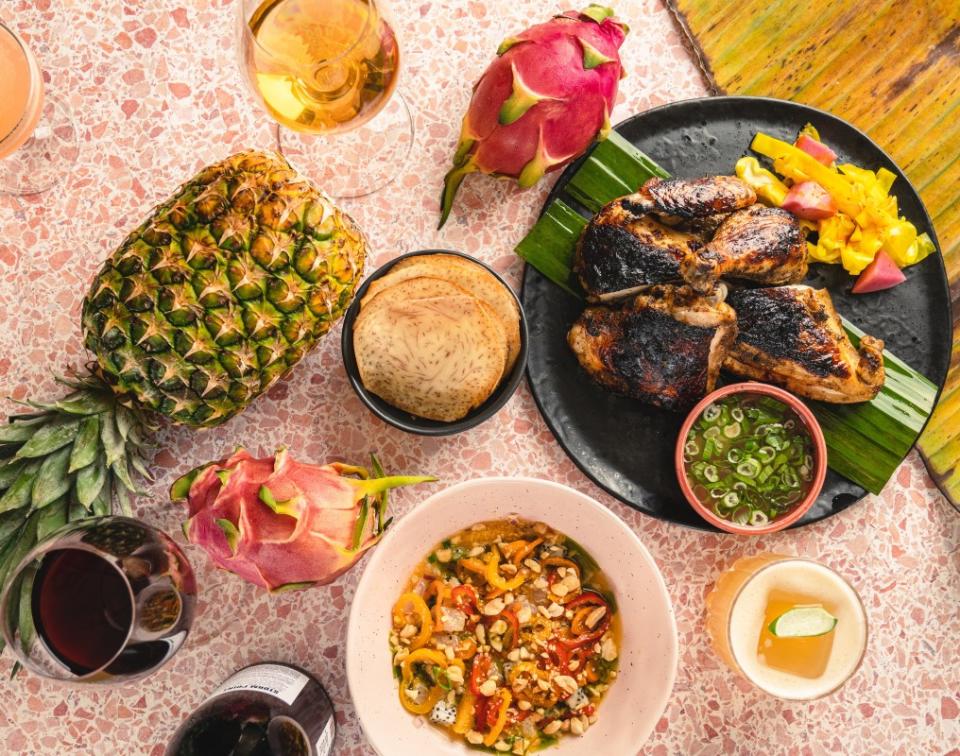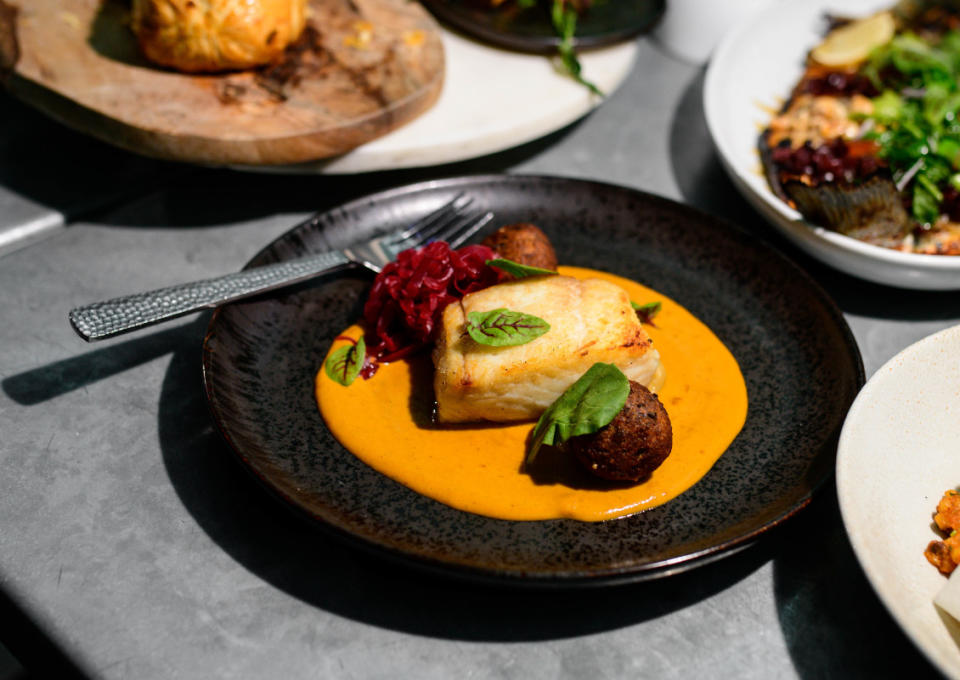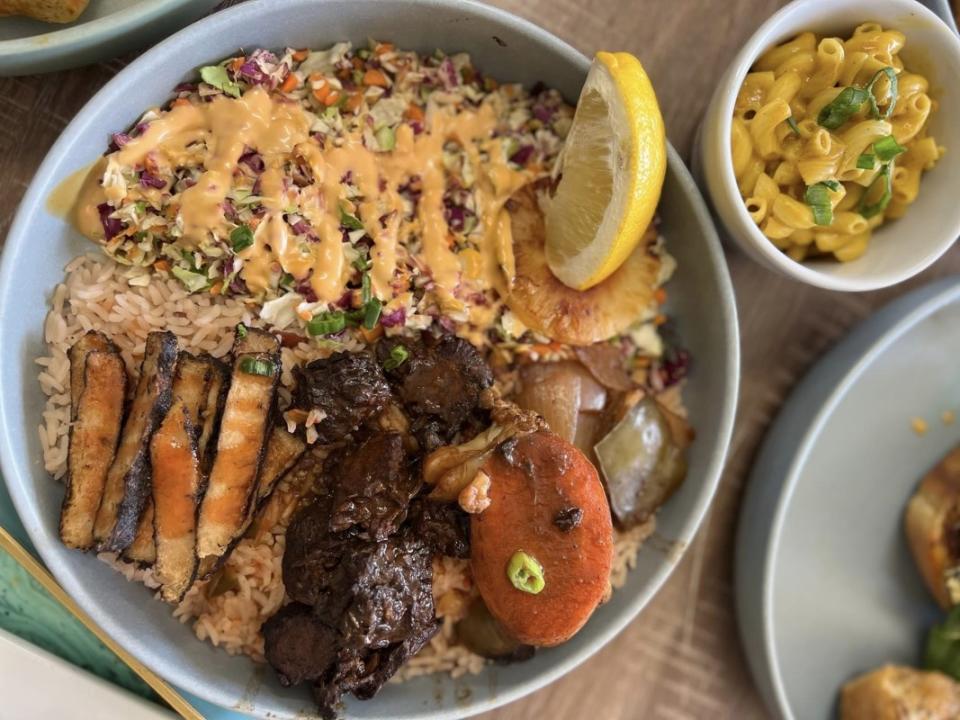How to Celebrate Black History Month, According to Black Chefs

Black History Month Colors
When the calendar flips to February 1, there's a noticeable shift in the air as red, black and green colors grace mugs and journals in your go-to store. Black history specials dominate streaming platforms, and the spotlight on Black creators shines brighter than usual.
This Black History Month, the national theme directs our attention to Black Americans’ contributions to the arts. Cooking is by far one the greatest forms of artistic expression, filled with creativity and culture, telling stories that span generations within one single dish.
Take artistic culinary trailblazer and enslaved Chef James Hemings for example. He revolutionized American cuisine by introducing European delicacies like macaroni and cheese, French fries, and crème br?lée to the nation's palate in the 1700s. Fast forward to today, and the legacy of Hemings lives on in the love language of food, weaving through the traditions of Black culture from Juneteenth watermelon feasts to Sunday soul food throw-downs featuring 8 to 10 courses in homes across America.
From the rich cultural heritage of Africa to the bustling kitchens of America, the impact of Black chefs and food figures continues to shape the culinary landscape. This Black History Month, we get to celebrate this legacy through the lens of chefs from coast to coast. Join us in discovering the many ways these culinary artists invite you to savor and honor Black history through the joy of food.
Related: I'm a Food Editor and These Are the Black-Owned Food & Beverage Brands I Swear By
Chef Jenn Ross
“Dahling, I have two recommendations for celebrating Black History Month. The first is to get with an elder and find out something they would want you to do once they are with the ancestors. You never know what they might say. The answer could be as simple as continuing their garden. You’ll quickly find out what’s personal and important to them. My second recommendation is to remember that Black-owned businesses could benefit from year-round patronage. Please support by buying, offering the businesses time to complete the orders and not asking for discounts or freebies.”
Chef Anthony Jones
"I would recommend spending time during Black History Month to educate yourself on cultural practices and histories of Black America while also visiting and supporting local businesses in your community. Repetition of this practice will eventually help it become part of your weekly routine. Here at the restaurant, we bring flavors from Africa and Latin America into the kitchen and combine them into our dishes.”
Chef Ting
“A few tips for folks who are looking for ways to celebrate Black History Month are: 1. Support a Black-owned business either in person or via Amazon, which has a filter that highlights Black businesses. 2. Read a book about Black culture: Zami: A New Spelling of My Name by Audre Lorde; Black Joy by Tracey Michae'l Lewis-Giggetts; Black Boy by Richard Wright; Ain't I a Woman: Black Women and Feminism by Bell Hooks; and The Fire Next Time by James Baldwin. 3. Go visit an art exhibit. Check out up-and-coming female artist Haili Francis or exciting seasoned artist, Charly Palmer who just created a stamp for Black History Month. 4. Go to Target and buy Black brands like The Honey Pot, The Lip Bar, and Sienna Naturals—which are a few of my favorites."
Related: The Significance of Black History Month and Why It Is Celebrated in February

Courtesy of Chef Tavel Bristol-Joseph
Chef Shalom
“Support Black-owned businesses. Look for Black-owned businesses. The fact that Google has a Black-owned business filter shows that there is a large group of people seeking to support Black entrepreneurs and creators. We’ve come a long way as a community to be able to own businesses, and this is important to remember.”
Chef Helene Henderson
"The best way to celebrate, honor, and acknowledge Black History Month is to recognize that history unknowingly repeats itself and the current times we're living in unfortunately reflects those in history, but it's not ancient history. Ruby Bridges, the first African American child to attend a formerly whites-only school after the Brown v. The Board of Education ruling is almost 70 years old and she's still a prominent civil rights activist to this day. Martin Luther King, Jr. gave his 'I Have a Dream' speech only 61 years ago and it still rings true today; His dream, our dream, my dream—is not yet a reality.
Along the lines of history repeating itself, my father had a fresh juice truck called Fruity Rudy that operated in the late ‘80s on the UC campuses. Here I am today, inadvertently, selling smoothies, fresh juices, and vegetable-forward dishes. This Black History Month, I would also love to see people supporting black business owners in their local area, so that those businesses can continue to thrive and, like me, their children can grow up to be entrepreneurs and business owners too."
Chef Jeffrey Lampkin
“To celebrate Black History Month, it’s time to take it back to the dinner table to keep the family together. This month, bring the family to the table with an old-fashioned Sunday potluck with all the favorites—fried chicken, ham, yams, and mac 'n cheese—and just talk about the good times. When the day is over, the family will be united and full and saying. "Look what the Lord has done for our family!""
Related: In Honor of Black History Month, 30 Black History Facts You May Not Be Aware Of

Courtesy of Chef Anthony Jones
Executive Sous Chef Nana Darkwah
“Black History Month is a time to celebrate African American culture and food has an incredible power to unite us across generations. Cooking passed-down traditions and paying homage to those who came before us. I grew up in Ghana, and I learned cooking from my late grandmother, who shaped me into the chef I am today. Honoring my roots and background, I make sure that every food I make has an element of my background to introduce unique African flavors to diners. By blending traditional techniques with modern cuisine, we bridge the past with the present and continue to honor those before while nourishing the next generation.”
Chef Carlos Brown
"Black History Month should remind us to celebrate the incredible contributions of Black chefs to American cuisine and our culture. You can enjoy dinner at a Black-led restaurant, but there's also nothing like making something with your own hands. My mother taught me the importance of cooking with your soul and the influences of Gullah cuisine with its African, French, and Native Indian roots make preparing a meal more than just food; it's an adventure through history. Ultimately, food should be an encounter that leaves you wanting more. "
Chef Tavel Bristol-Joseph
“The way I would recommend celebrating Black History Month is to support as many Black businesses as possible. It may take more time, money or energy, but being intentional in February can lead to long-lasting relationships. The truth is, no one wants to be celebrated just because of the color of their skin, but I think it's a great gateway to understanding Black culture and Black significance by taking the time to be intentional.”
Related: I Tried Rosa Parks' Featherlite Peanut Butter Pancakes and My Breakfast Will Never Be the Same

Courtesy of Jenn Ross
Chef Nichole Mooney
"Black History Month is the perfect time for families to learn, embrace, and honor the history, culture, and contributions made to American cuisine through the Transatlantic slave trade. It’s also an ideal time to document familial recipes to preserve family legacy. Often, the recipes for grandma’s sweet potato pie or pop-pop’s famous collard greens are in their heads and not on paper, so unfortunately, when they depart this life, those memorable dishes leave, too.”
Chef Jay Hinson
“I feel the best way to celebrate Black history is to not limit my enthusiasm for Black history to one specific month. I constantly seek ways to enjoy and engage with Black-owned businesses throughout the year. However, one simple and delicious way to celebrate Black excellence is to find a local, Black-owned restaurant and enjoy a meal. When possible, I like to speak with the owner/chef regarding their inspiration for their cuisine. It fascinates me to gain a deeper understanding of a person’s culture and family history, and how someone’s background in a different region of the country or around the world can provide so many opportunities to utilize different ingredients that create a totally unique food experience.”
Up next: 25 Soulful Recipes From the African Diaspora To Celebrate Black History Month
